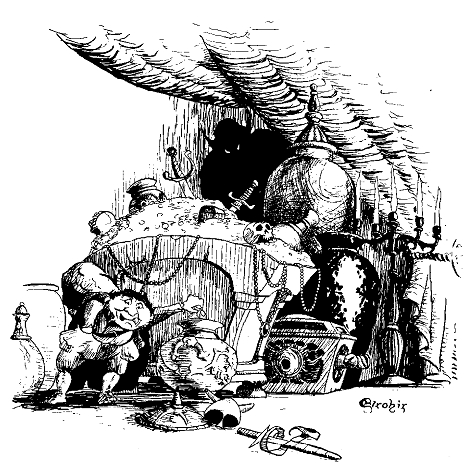

| Dragon | - | AD&&D | - | Dragon #36.5 |
| Taxes | - | - | - | - |
In even the most balanced of dungeons, there comes a time when
the players will, against all odds, beat the monster that couldn’t
be
beaten and suddenly become fantastically rich. The treasure burns a
hole in their psyches, and they find all sorts of ways to put it to
use. For
the next 6 months, the DM is liable to be plagued with questions like
“What are the technical aspects of pyramid building?” or “Are war
galleys a tactical necessity in desert defense?”
To keep the economic situation from getting out of hand, all the DM
needs to do is plug in a new NPC: The Tax Collector.
The Tax Collector (TC) should be played by the DM in
the same
manner as a Ninja (TD #16). But whereas the
Ninja (fighting for the
glory of the DM) clobbers characters for their impertinence, the TC
hits
’em where it really hurts—below the belt (in the pocketbook, of course).
TC’s are gated in from their temples whenever a stash of gold, gems
or the like changes hands. The particular taxes to be applied can be
chosen by the DM, with the following list as a guide:
—The Rich Tax: Used on players who have just come into a sizable
bankroll. The rate may be somewhere around 75 percent of the wealth
gained. If a taxpayer complains, tell him the money is an assessment
for
SEAKOG (Society for the Evolutionary Advancement of Kobolds,
Orcs
and Goblins).
—The Poor Tax: Used on players who have just paid the Rich Tax.
They should be poor now. If they aren’t, you better raise the Rich
Tax.
—The Tax Tax: Used to pay the TC’s salary and expenses. It is
based on the amount of all taxes previously paid, and should always
amount to more than the value of a character’s or party’s total wealth.
—The Property Tax: A general tax on all property, real or personal,
owned by the character.
—The Non-Property Tax: A general tax on all property, real or
personal, not owned by the player.
—The Inn Tax: A tax paid by all people sleeping in inns.
—The Out Tax: A tax paid by all people sleeping anywhere else.
—The Carpet Tax: A seldom-used assessment on all players who
make bad puns during the course of an adventure.
The TC has the ability to cast many spells of a magical or clerical
nature, and also has a number of special powers at his disposal
The most powerful of these is a super-powerful Confusion
spell.
Used but once a year, it has no saving throw and causes immediate,
severe confusion for 1-12 weeks. In our country, the spell is in the
form
of a scroll which we call Form 1040.
The TC’s other major power is the Audit spell, basically an offensive
maneuver to be used when all other methods have failed.
The appearance and employment of a TC goes something like this:
TC’s will gate in before a party has
time to do anything about it. There
will always be at least one more TC than there are members in a party.
TC’s will be armed with tridents, which they will poke into their
victims until the hapless taxpayers hand over the amount of valuables
required. When this is done, the TC’s are ready to be recalled to their
temple. In our country, the temple is known as the Treasury Building,
and the members of the cult are those people who worship the Almighty
Dollar.
If the collection attempt fails for any reason, the TC will use his
powerful Audit spell. This spell is a combination of Time Stasis (the
audit <Temporal Stasis>
starts at 8:00; 3 hours later, you look at your watch and it’s 8:20),
Feeblemind (even the most intelligent
Magic-User or the wisest Cleric
has no saving throw) and Reduction (because the taxpayer feels about
<Reduce>
3 inches tall when it’s over). The Audit spell is always successful,
unless the player happens to have a Tax Advisor.
The Tax Advisor (TA) is a very rare subclass of TC.
A TC becomes a
TA when he performs acts that cause him to change alignment (all TC’s
are lawful neutral).
The TA has 3 special spells: Shelter, which allows a character to
hide his gold and gems before the TC can get to them; Invisible
Deduction, which gives a character bargaining strength when discussing
the “real” reasons why a 1 million g.p. tax is necessary; and Reverse
Audit, which can negate the effects of an Audit spell. The chance of
this
spell working is 10% for every level of experience that the TA is over
the
TC casting the Audit. Of course, good, high-level TA’s are as hard
to find
as 18/00 strength Kobolds.
DM’s don’t need to feel guilty about introducing the TC into a
campaign; think of it as reminding the players of their roots in poverty.
And always remember: The only 2 sure things are death
and you
know what.